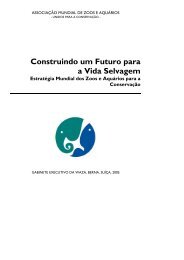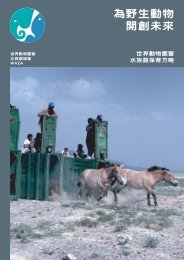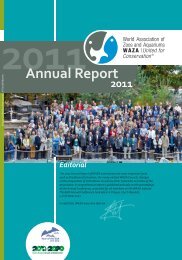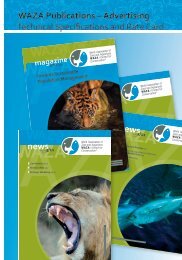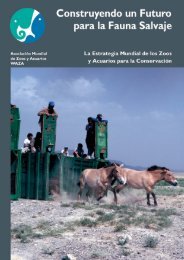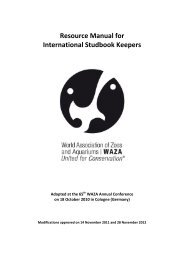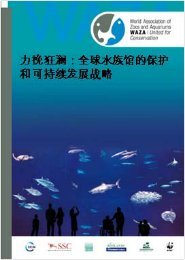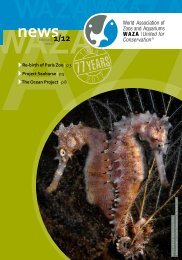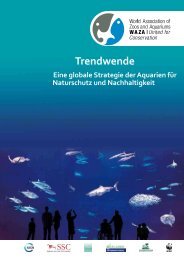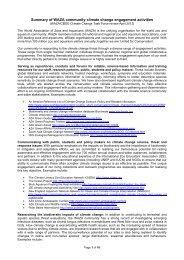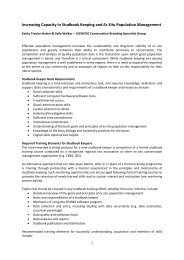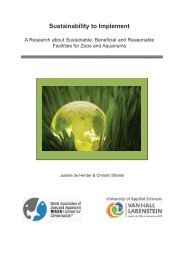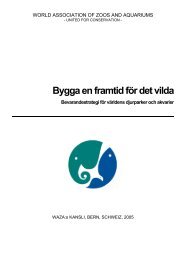Towards Sustainable Population Management - Waza
Towards Sustainable Population Management - Waza
Towards Sustainable Population Management - Waza
Create successful ePaper yourself
Turn your PDF publications into a flip-book with our unique Google optimized e-Paper software.
WAZA magazine Vol 12/2011<br />
Fig. 2<br />
Number of taxa for which there are studbooks, low intensity managed populations<br />
or intensively managed populations for each of ten regional zoo associations<br />
as well as the Amphibian Ark.<br />
There are many additional factors<br />
that should be considered, such as<br />
the genetic and demographic status<br />
of the ex situ populations as well as<br />
feasibility issues; however, this tool<br />
can serve to produce a shorter list of<br />
potential candidates that can then<br />
be evaluated more thoroughly with<br />
additional criteria. Currently, this process<br />
is being undertaken by WAZA’s<br />
Committee for <strong>Population</strong> <strong>Management</strong><br />
(CPM). Another potential use of<br />
this database is to quickly identify the<br />
current management level of the ex<br />
situ population within the native geographic<br />
range of each taxon. This in<br />
turn can help to identify gaps where<br />
range country involvement and ex<br />
situ population management can be<br />
encouraged or supported. The expansion<br />
of the database to explicitly<br />
identify range country management<br />
will facilitate this.<br />
Conclusions<br />
Increasingly, intensively managed<br />
populations may be needed to reduce<br />
the risk of extinction for wildlife<br />
species. Only a fraction of currently<br />
threatened species are held by the<br />
world’s zoos, only about half of these<br />
are actively managed and a small<br />
fraction of these are believed to be<br />
sustainable. There are many opportunities<br />
to increase the viability of<br />
regional ex situ populations through<br />
inter-regional databases and interregional<br />
population management.<br />
A database of managed species has<br />
been created as a tool to help identify<br />
opportunities for inter-regional cooperation<br />
and management of existing<br />
studbook species, including increased<br />
involvement of range country ex situ<br />
programmes.<br />
Acknowledgements<br />
I would like to thank the following<br />
individuals for assistance in providing<br />
programme data and assessments:<br />
Kazutoshi Takami, Chris Hibbard,<br />
William van Lint, Christina Henke,<br />
Danny de Man, Xie Zhong, Sally<br />
Walker, Caroline Lees, Roz Wilkins,<br />
Laurie Bingaman Lackey and Virginia<br />
Lindgren. Thanks to Kristin Leus for<br />
providing ideas and comments on<br />
this article.<br />
References<br />
Managed Programmes<br />
• Conde, D. A., Flesness, N., Colchero,<br />
F., Jones, O. R. & Scheuerlein,<br />
A. (2011) An emerging role<br />
of zoos to conserve biodiversity.<br />
Science 331: 1390–1391.<br />
• Hoffmann, M., Hilton-Taylor, C.,<br />
Angulo, A., Böhm, M., Brooks,<br />
T. M. et al. (2010) The impact of<br />
conservation on the status of the<br />
world’s vertebrates. Science 330:<br />
1503–1509.<br />
• IUCN (2002) IUCN Technical<br />
Guidelines on the <strong>Management</strong> of<br />
Ex Situ <strong>Population</strong>s for Conservation.<br />
Gland: IUCN.<br />
• Leus, K., Traylor-Holzer, K. &<br />
Lacy, R. C. (2011) Genetic and<br />
demographic population management<br />
in zoos and aquariums:<br />
recent developments, future<br />
challenges and opportunities for<br />
scientific research. International<br />
Zoo Yearbook 45: 213–225.<br />
• Thomas, C. D., Cameron, A.,<br />
Green, R. E., Bakkenes, M., Beaumont,<br />
L. J. et al. (2004) Extinction<br />
risk from climate change. Nature<br />
427: 145–148.<br />
33



